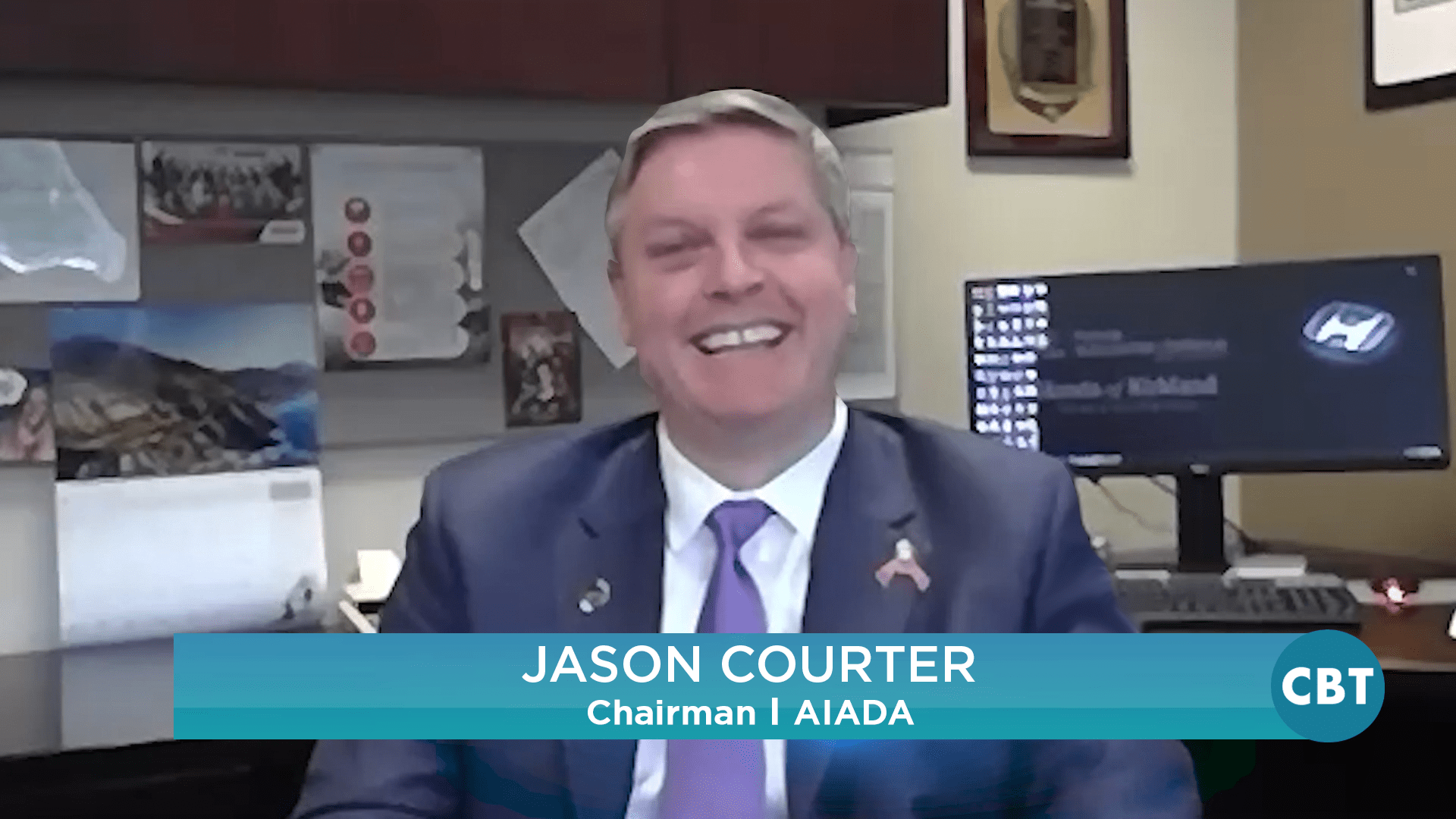There has been no shortage of auto industry news so far in 2020. From the CoronaVirus to crude oil prices and everything in between, there is an air of uncertainty that has put the market on edge. Here to discuss what this news means for dealers and auto retail professionals is Jason Courter, the new Chairman for the AIADA. Jason and Jim also discuss Colorado’s latest EV amendment, and what his goals are while in office.
Related: Howard Hakes Reflects on a Successful Year as 2019’s AIADA Chairman
Jim Fitzpatrick: Hi everyone, Jim Fitzpatrick with CBT News. Thanks so much for joining us today. Today we’ve got a special guest star with us here, Mr. Jason Courter. He’s the new chairman of the AIADA. Thank you so much for joining us Jason.
Jason Courter: Thanks for having me.
Jim Fitzpatrick: Sure. You’re one busy guy right now, right? You’re in the state of Washington trying to hold on to it all.
Jason Courter: Yeah. You know, we’re kind of in the moment of ground zero here. We do have one of our franchise, a Honda franchise, located in Kirkland, Washington, which as everyone’s aware has been in the news.
Jim Fitzpatrick: That’s right, that’s right. So, I hope everything is okay and works out for you. That’s a concern of yours I’m sure.
Jason Courter: Ongoing. Every half hour, every hour, we stay on it. If you want to talk about that, we can talk about that too.
Jim Fitzpatrick: Yeah, sure, sure. I’ve got that on my list for sure.
Jason Courter: Okay, great, great.
Jim Fitzpatrick: As I mentioned in the opening, you did just take over the helm at the AIADA. I’d like to talk to you a little bit about some of the things that you’d like to get accomplished in 2020 during your chairmanship. So let’s start there.
Jason Courter: Great. So AIADA is celebrating its 50th anniversary of course.
Jim Fitzpatrick: Yeah, big year.
Jason Courter: And what’s important about that is … You know, I’m a third-generation dealer. My grandfather started in this industry as a Buick dealer in Auburn, Washington.
Jim Fitzpatrick: Oh wow.
Jason Courter: My father was also involved in the Buick business during when I was about five, six years old. My history goes back to the dinner table-
Jim Fitzpatrick: Yeah.
Jason Courter: … Sitting at the dinner table and talking about the auto biz. I kind of looked up, I figured one day that this is what I was going to do. Yes, I went to college, I got a degree, but I always knew that the cars were in my blood.
Jim Fitzpatrick: Yup.
Jason Courter: And you know, it’s a family business. Some people call us nepotism motors you know? So, we’re just so involved just in the auto industry. We represent the Honda brand name in our market as well. So really my background, I’ve been doing this job really since out of college, that goes back to about 1997. It’s getting involved with AIADA is something that I really got involved with in high school when my father was also on the board.
Jim Fitzpatrick: No kidding, wow.
Jason Courter: He started bringing me back, he says, “Son, if this is going to be something that you’re interested in doing for the future, then come with me. Forget about spring break. We’re going to go back to Washington D.C. to the summits and the fly-ins. You’re going to see what this is all about.” So, I was blessed to be able to have the opportunity to go with him, see what it is, and again, as we talk about our 50th year, it’s important that especially in times like this. Really what our mission is free trade, which has continued to be our mantra 50 years ago to today. We talk about the same issues.
Jim Fitzpatrick: Yeah.
Jason Courter: Learning about it, that’s been our core principle.
Jim Fitzpatrick: Sure. Lets kind of go through some of the disruptors that face the today’s automobile dealer and some of the things that keep some of your constituents awake at night, right?
Jason Courter: Sure.
Jim Fitzpatrick: Yeah. Let’s begin with digital retailing. You know the whole notion that somebody, I guess Carvana, has showed the consumer today that they can sit on their couch, in their pajamas basically, and order a vehicle online with a liberal return policy-
Jason Courter: Sure.
Jim Fitzpatrick: … and have it delivered to their front door and do the whole transaction via the web.
Jason Courter: Right.
Jim Fitzpatrick: What do you say to that? Is that where we’re headed as an industry and is that something dealers should be focused on retrofitting their stores to handle?
Jason Courter: Well, I’m a Seattle Seahawks fan and Russell Wilson is our famous quarterback, and he says, “Why not us?”
Jim Fitzpatrick: Yeah.
Jason Courter: Okay? And that’s the way I look at it. Yes, these are opportunities for us to see other opportunities in the marketplace. Can they be successful models? I think anytime that there’s disruption, or a new manufacturer, or a new company comes in the market to talk about what they can do to market and sell vehicles in our markets. I think that we have to pay attention, be open to it, and still learn from it you know? There’s a lot to be learned from here. I know the online selling for one, there’s a lot of products that are out there right now that I would just recommend dealers spend the time to review what those are. Maybe there’s a dealer in your market that’s already doing it. I know in our case with American Honda, American Honda has a new product coming out or a new program called the digital customer journey. They’re focused on this and they’re right there to support their dealers to help answer the questions. They wade through some of the issues that what they’ve learned from other dealers or the Carvana’s of the world, to make sure that we don’t potentially step into something that we wish we never did.
Jim Fitzpatrick: Right.
Jason Courter: And I think that’s very important to see that our manufacturers also get behind this and we can all work together with these good relationships with our manufacturers so we can keep progressing.
Jim Fitzpatrick: I spoke to one dealer that’s got 23 franchises in the southwest. His concern was that you know, because of Walmart kind of paving the way here where you had all of these mom and pop businesses supporting different local economies and such and a number of people work there. But then all of a sudden, as we remember 20 years ago, the landscape was suddenly littered with Walmart’s on every corner.
Jason Courter: Sure.
Jim Fitzpatrick: Obviously today I think they’re one of the largest employers in the country, if not the largest in free enterprise. Is that a concern that people will forget and just say, “We’re really just concerned about getting the best value at the lowest possible dollar. And if that’s better by a conglomerate to be delivering us these vehicles via our cell phones, then so be it.”
Jason Courter: Well, I can you this, however I answer that today could change tomorrow. So, it comes down to what I believe. I believe we still supply jobs. Here I’ve got 250 employees. What concerns me the most is making sure that I provide a good value, and I think about my employee, and I think about our customer. That we provide a good enough value, invest in our facilities, make sure we have a safe place to buy, we’re open the hours that they need us, we’re open at night, we’re open on the weekends for service and parts. That when our employees count on us for making the good decisions so we can keep that going.
Jim Fitzpatrick: The front end of the house still suffers from about a 60 to 70% turnover rate as you know, industry wide. What, from your perspective as now that the chairman of an organization, what steps do you need to take in this business in order to start to change that and get it to a livable number where you know today’s men and women aren’t going to be turned over within the first 12 months, either into another industry or to another dealership?
Jason Courter: I believe … And a lot of reasons why I’m involved with AIADA this year, and two as well what my mission is, is that dealers need to tell their story, okay? That means on the front line, what’s your orientation process like, okay, when you bring the new sales person in? Did they come from the outside or have they been somebody that’s maybe sold cars at six or seven other dealerships and now they end up? How can you be different, okay?
Jim Fitzpatrick: Right.
Jason Courter: Let’s talk about 401k plans. I know compared to last week we’ve been talking about obviously this stretch run that has been fantastic. Well, certain people when they believe in the fact that as a career path goes over five, six years, how does that nest egg look for the operation that I work for? I think dealers are so compassionate, involved inside their communities that sometimes we don’t talk about the certain things that we offer to our employees, especially our salespeople. That part of becoming a salesperson is they also build their lifetime clientele. We have some people here that no matter what, they will only buy from that specific sales person because they continue to follow up, they know their family, they know their friends, they know you know everything about them-
Jim Fitzpatrick: Sure.
Jason Courter: … And that they always tell them, “Hey, it’s time for me to get a car.” You have to really play the long play here. We as dealers need to spend the time. If it’s an hour, if you’re doing nothing right now, that’s not helping. But my strongest recommendation is really sit down, write something out, and be committed to the orientation process to bring people in and why you matter. Get people bought in to beyond just selling the car.
Jim Fitzpatrick: Thank you for all the time you’ve given us. But I got a couple of other things here that I just want to run by you. There’s a new company coming into the U.S. that happens to fall under the import brand. I’d like to get your comments on it. Rivian, that looks like they’re trying to sell their vehicles the same way Tesla sells theirs, which is direct to consumer and bypassing the franchise system. What’s your take on that and where does the association stand on that?
Jason Courter: I couldn’t be more proud. You know different states, I’m from the state of Washington and I understand there’s different franchise rules in different states. I’m not a pro in any of them.
Jim Fitzpatrick: Yeah.
Jason Courter: But what I will say, is that we had Rivian did give some testimony in our state of Washington at our recent Olympia dealer data we had in early February. We had over 100 dealers down in Olympia on roll call to support two of the dealers give the opposite testimony. The issue, what you’re talking about, is probably a great product. I mean obviously we’ve all seen pictures of certain things and there’s new and exciting things that are more manufacturers are going to still build the same kind of products. They’re there, they’re growing. What’s important to remember here, us as dealers need to be aware of the fact that we are the first front line communication to our customer that bridges our customer to our manufacturer-… okay? When it comes down to a certain situation, if a customer comes in for a repair and maybe we didn’t get … When we communicate with the manufacturer, we go and try and solve that problem one way. A week later if the customer does come back for the same issue, we are their voice and we need to remember that, that we help bridge that.
Jim Fitzpatrick: The tariff situation seems to be around as long as the Trump administration has been around. In your opinion, has Trump been a good thing or a bad thing for the auto industry?
Jason Courter: You know, I’ll leave that to anyone that has their own personal views on it. What I look at is the opportunity that when we’re presented with the idea of tariff, I try and deploy my resources that, is this a good thing for us or is it not good for us?
Jim Fitzpatrick: Right.
Jason Courter: Then I like to reach out to AIADA and, or our state association. What are the talking points? What are certain things that we can go to bat to make sure that we protect the future of our industry? Whether it’s President Trump or whoever else it is, it’s not just tariffs, there’s other issues. We’ve been at this for 50 years. The Volkswagen dealers had to deal with the chicken tax 50 years ago. So, it’s not necessarily President Trump, it’s who’s ever in the administration that put the threat of free trade no matter what it is.
Jim Fitzpatrick: Yeah. If we were sitting here 12 months from now and your chairmanship is over, what would you like to have on your to do list done and crossed out?
Jason Courter: I would say what’s really important for myself is feeling a little bit better about a little more re-engagement from our existing international nameplates. To say that we had a successful fly-in event, okay. as well. I’d like to have our Affinity partners, they’ve been wonderful through all this of course, and we can’t do it without them-
Jim Fitzpatrick: Sure.
Jason Courter: … especially, but seeing what we can do to communicate and bridge that together and educate them on the issues and have them participate in what our issues are about, and to have the Coronavirus behind us.
Jim Fitzpatrick: That’s a handful right there. The things to get done this year, right?
Jason Courter: Yup, absolutely. I’m no doctor, I’m no doctor, but I’m trying to follow the doctor’s rules here.
Jim Fitzpatrick: That’s right. Well, Jason Courter, the new, newly installed AIADA chairman from the great state of Washington. Thank you so much for joining us here on CBT news. This has been such a pleasure and we’d love to have you back in a few months to see how these things are moving along.
Jason Courter: Anytime.
Jim Fitzpatrick: Okay.
Jason Courter: I’m here all year.
Jim Fitzpatrick: Thanks so much.









